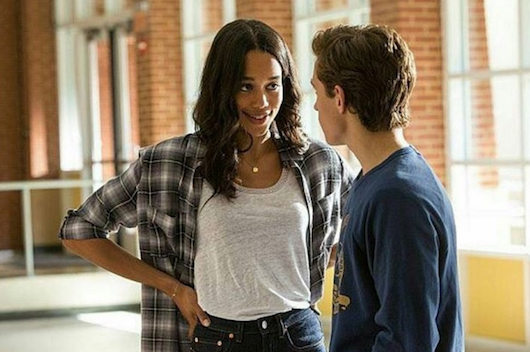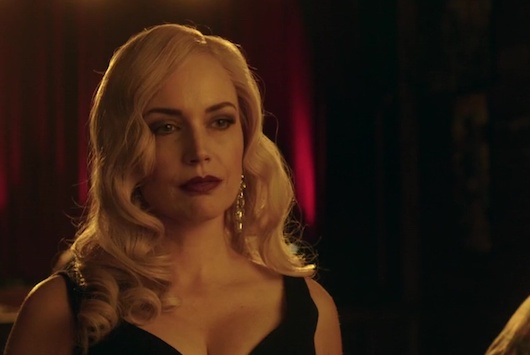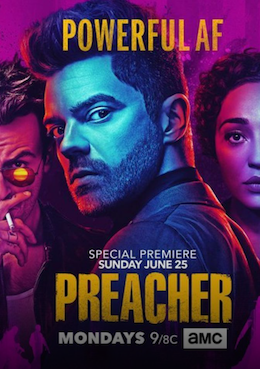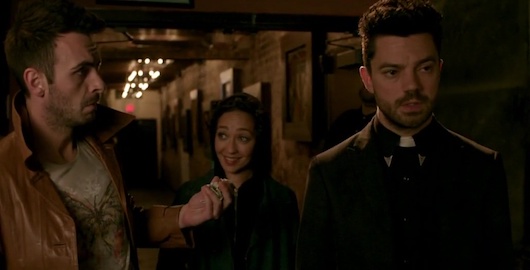 FILM
FILM In Which We Meet Our Friends In New Orleans
 Monday, July 31, 2017 at 8:02AM
Monday, July 31, 2017 at 8:02AM 
Bye Girl
by ETHAN PETERSON
Girls Trip
dir. Malcolm D. Lee
122 minutes
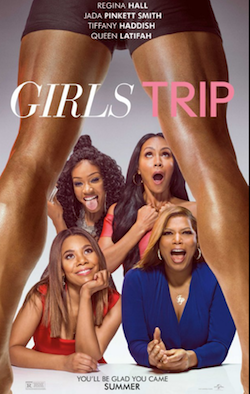 Ryan (Regina Hall) gives out two lectures at the beginning of Girls Trip. The first is to her white assistant Liz (Kate Walsh) who uses a lot of African-American slang and buzzwords around her boss. Since they will be spending the weekend at the Essence Festival in Louisiana, she warns Liz to stop saying these racist things, since she will be around people who might be offended by them. Liz accepts her admonition, while saying farewell to Ryan by stating, "Girl, bye."
Ryan (Regina Hall) gives out two lectures at the beginning of Girls Trip. The first is to her white assistant Liz (Kate Walsh) who uses a lot of African-American slang and buzzwords around her boss. Since they will be spending the weekend at the Essence Festival in Louisiana, she warns Liz to stop saying these racist things, since she will be around people who might be offended by them. Liz accepts her admonition, while saying farewell to Ryan by stating, "Girl, bye."
The second speech is to her friend Sasha (Queen Latifah) who runs a gossip blog. She criticizes Sasha for abandoning real journalism in her crusade for clicks, posting negative stories about celebrities that are sometimes nasty and unkind. Sasha does not really justify her occupation, but explains that she does this work in order to pay the rent on what looks to be a $4.5 million apartment.
In this lavish home, Sasha has no less than three desktop computers next to each other. Since she has nothing in the way of a staff, it is unclear what she uses these different terminals for. Ryan invites her to the Essence Festival, where she hopes to find a juicy story that will increase her pageviews. Fortunately, this bizarre character motivation is not really a huge part of Girls Trip, and Sasha later shuts down her blog, unhappy with her choice of work.
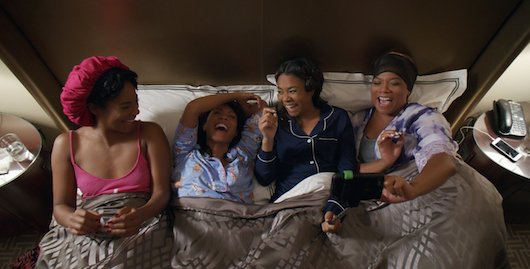
Anyway, Ryan is generally upset for most of Girls Trip. Surrounded by some of the finest black actresses of her generation, Hall (Scary Movie) struggles intensely as the centerpiece of her friend group, which calls itself the Flossy Posse. It is never mentioned why these four women adopted this name in the first place, but their FP necklaces and vests are very charming in the miasma of bright colors and alcohol that is New Orleans.
Director Malcolm D. Lee displays one image of the ladies in front of the Louisiana Superdome that is particularly heartwarming at the beginning of Girls Trip; this is later contrasted with the renovation of the building and the sale of the naming rights to Mercedes-Benz.

Everything went corporate, you see, even African-American culture. Ryan's husband Stewart (a tragically bad Mike Colter) is a former NFL tight end who is cheating on her with a model named Simone (Deborah Ayorinde). He impregnates the lovely young woman.
Ryan, unaware of this development, and incapable of having children herself, smashes the woman's head on a bar at the unexpectedly violent conclusion to a dance contest. Very little attention is paid to this aspect of Girls Trip, but her treatment of Simone is pretty horrid and possibly worthy of prosecution. Ryan tries to paper over the problems in her marriage by hooking up with a bass player, although he is not super into it.

It is pretty hard to watch Regina Hall's scenes in Girls Trip, because her character is completely unlikable and seems to be kind of a nasty jab at Beyonce. Fortunately, Girls Trip is saved by the rest of the Flossy Posse, composed of Lisa (Jada Pinkett Smith) and Dina (Tiffany Haddish).
Both women are far more complicated and entertaining than their showbiz friends, and the contrast between the two types of people begins to make the parade of celebrity cameos in Girls Trip feel quite hollow. So much of the film seems like a series of segments from E! News, about people whose entire purpose in life seems to be getting publicity for themselves.

Small moments, like when Lisa talks to her children or Dina is fired from her job are absolutely the best parts of Girls Trip, where the edges of an actual film seem to encroach on the milquetoast main conflict. Haddish's raunchy humor correctly takes all the attention, but she also listens and responds to her fellow performers with adeptness and grace. Besides when Jada Pinkett Smith gives a guy a blowjob with a grapefruit on his dick, it is the most exciting things ever get in New Orleans.
Ethan Peterson is the reviews editor of This Recording.































